IT Recruiting
Top 9 Machine Learning Recruitment Agencies
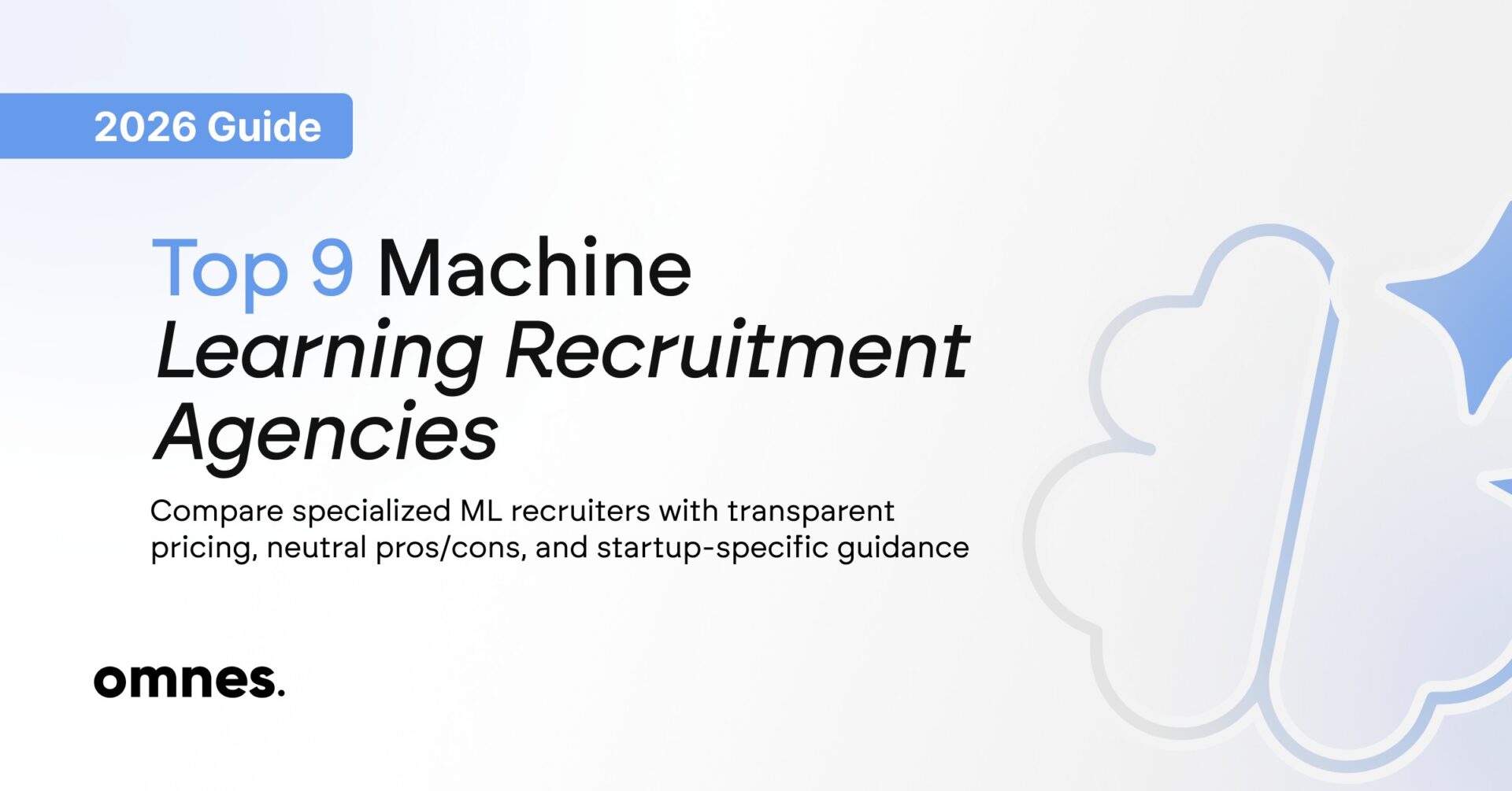
TL;DR: The best ML recruitment agencies for startups are Omnes Group (technical depth meets startup collaboration), Insight Global (extensive network and proven track record), and Harnham (specialized data science expertise). Standard fees range from 15-25% of first-year salary, with most placements completed in 14-30 days versus 42+ days for in-house hiring.
Why Specialized ML Recruitment Matters in 2025
The machine learning talent landscape has fundamentally shifted. With AI market growth projected to reach $1.8 trillion by 2030 and 74% annual growth in ML job postings, the competition for qualified engineers has intensified dramatically. What we’re seeing across our client base is striking: traditional recruitment approaches that worked for general software roles completely fall apart when hiring ML specialists.
Here’s the reality, only 22,000 AI specialists exist globally, while the projected hiring gap will reach 700,000 unfilled positions by 2027. Your startup isn’t just competing with other early-stage companies; you’re competing with FAANG companies that absorb 70% of top ML talent and offer compensation packages 67% higher than traditional software roles.
The technical complexity adds another layer of challenge. ML skills evolve rapidly, with a half-life of roughly five years. Evaluating whether a candidate truly understands transformer architectures versus simply listing “LLM experience” on their resume requires deep technical knowledge that most internal recruiters lack.
This is where specialized ML recruitment agencies create genuine value. They’ve already built relationships with passive candidates, developed rigorous technical vetting processes, and understand the nuanced differences between someone who can fine-tune a pre-trained model and someone who can architect your ML infrastructure from scratch.
What ML Recruitment Agencies Solve for Startups
Let’s rethink how you approach the hiring timeline. When you post an ML engineering role on LinkedIn, you’re looking at an average 42-day time-to-fill—and that’s if you successfully navigate the technical screening process. Specialized agencies compress this to 14-30 days by leveraging pre-vetted talent pools and established relationships with passive candidates who aren’t actively job hunting.
The cost of an extended vacancy compounds quickly. Each week without that senior ML engineer means delayed product development, missed competitive opportunities, and potentially losing technical leadership to competitors. A $30,000 placement fee starts looking reasonable when you calculate the revenue impact of filling a critical role 30 days faster.
Beyond speed, these agencies provide technical vetting expertise that’s difficult to replicate in-house. They can distinguish between someone with academic ML experience and someone who’s shipped production models at scale. They understand whether your microservices architecture needs someone with Docker/Kubernetes experience or just general containerization knowledge. They know that a React developer who’s only worked with class components might struggle with your hooks-heavy codebase.
The market intelligence agencies provide is equally valuable. They’ll tell you that your compensation package is 15% below market for senior NLP engineers in your region. They’ll flag that requiring five years of LLM experience is unrealistic given that GPT-3 launched in 2020. They’ll help you understand whether you actually need a machine learning engineer or if a data scientist with ML experience would better fit your stage and use case.
Finally, most quality agencies offer 90-180 day replacement guarantees, which significantly reduces your hiring risk. If the candidate doesn’t work out due to technical fit or cultural misalignment, they’ll restart the search at no additional cost.
Top 9 ML Recruitment Agencies: Detailed Comparison
1. Omnes Group
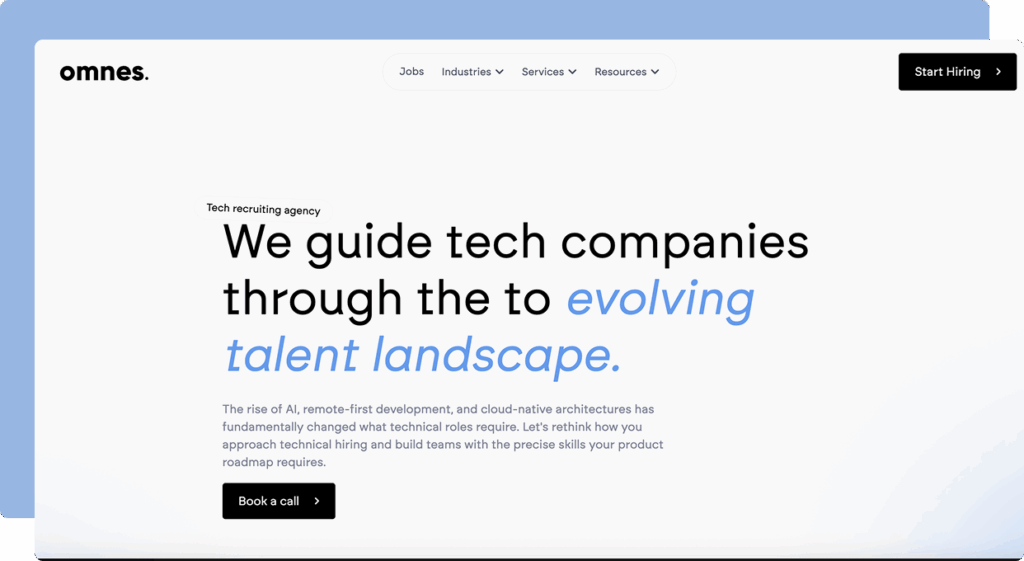
Omnes Group approaches ML recruitment as specialized consultants who understand both the technical requirements and market realities that others consistently miss. Rather than treating recruitment as a transactional keyword-matching exercise, they’ve built their process around understanding actual project needs and the evolving tech landscape.
What distinguishes Omnes Group is their technical depth combined with a collaborative, forward-thinking approach. They don’t just screen for TensorFlow or PyTorch on a resume, they evaluate how candidates think through technical problems and whether their experience aligns with your specific architecture challenges. When your stack requires someone who understands microservices with event-driven systems, they know to assess message queue experience, not just general backend development.
Key Specializations:
- Machine Learning Engineers (production ML systems)
- MLOps and ML Platform Engineering
- NLP and LLM specialists
- Computer Vision engineers
- Data Scientists with deployment experience
Best For:
- Seed to Series A startups building their first ML teams
- Companies transitioning from prototype to production ML
- Organizations needing strategic hiring guidance alongside recruitment
- Teams requiring both technical depth and cultural fit assessment
Services:
- Contingency and retained search models
- Technical assessment design and candidate vetting
- Salary benchmarking and market intelligence
- Remote and distributed team hiring expertise
- Collaborative consultation on role requirements and team structure
Geographic Coverage: US-focused with strong remote/distributed hiring capabilities
Notable Strengths:
- Deep understanding of current ML trends (AI impact on development roles, edge computing requirements, LLM integration)
- Relationship-building approach versus volume-focused recruiting
- Startup-specific guidance on when to hire specialized versus generalist ML talent
- Transparent communication style with regular updates and honest assessments
Typical Client: Early-stage technology companies (seed through Series B) scaling their ML capabilities, particularly those where technical leadership needs to understand exactly what skills their next hire requires to drive the product forward.
Not Ideal For: High-volume hiring needs requiring dozens of ML engineers simultaneously, or extremely tight budgets under $20,000 for placement fees.
2. Insight Global
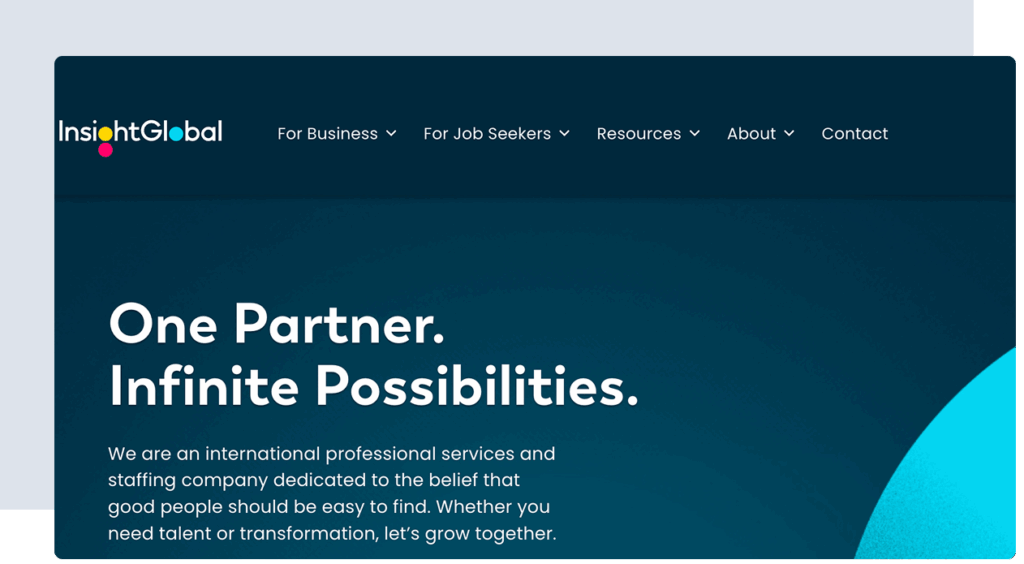
Insight Global operates as one of the largest technical staffing firms in North America, with extensive experience placing ML and AI specialists across enterprise and mid-market companies. Their massive network and established presence make them particularly effective for companies needing reliability and proven processes.
Key Specializations:
- Machine Learning Engineers
- Data Scientists
- AI Software Engineers
- MLOps Engineers
- Research Scientists
Best For:
- Mid-market to enterprise companies
- Organizations needing contract-to-hire flexibility
- Companies requiring both permanent and project-based ML talent
- Businesses seeking established vendor relationships
Services:
- Direct hire and contract staffing
- Staff augmentation for ML projects
- Technical screening and assessment
- Nationwide coverage with local market expertise
Geographic Coverage: Comprehensive US coverage with offices in major tech hubs
Notable Strengths:
- Extensive candidate database and network reach
- Established processes and consistent delivery
- Flexible engagement models (contract, contract-to-hire, permanent)
- Strong relationships with passive candidates across industries
Typical Client: Series B+ startups and established companies with ongoing ML hiring needs and preference for working with known, reliable staffing partners.
Not Ideal For: Very early-stage startups seeking highly personalized, consultative approaches, or companies prioritizing boutique agency relationships over scalable processes.
3. Harnham
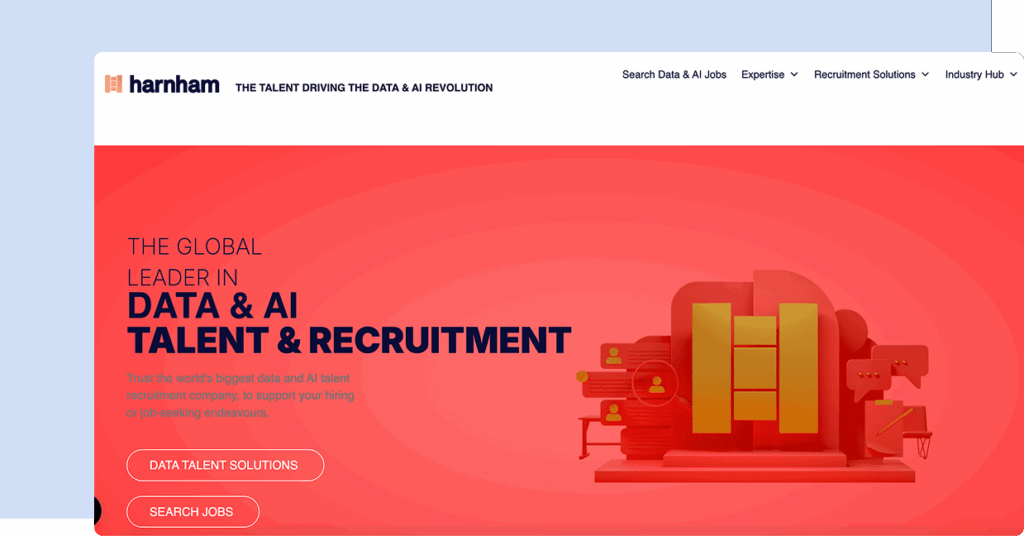
Harnham has built their reputation specifically within data science and analytics recruitment, making them deeply knowledgeable about the nuances between different ML specializations. Their focused expertise means they understand the difference between hiring a data scientist who builds models and an ML engineer who deploys them at scale.
Key Specializations:
- Data Scientists with ML expertise
- Machine Learning Engineers
- Analytics Engineers
- Data Engineers supporting ML pipelines
- AI Research roles
Best For:
- Companies building data science and ML functions
- Organizations in finance, healthcare, and retail sectors
- Businesses seeking candidates with strong statistical foundations
- Teams needing expertise in both ML and broader analytics
Services:
- Permanent placement (contingency and retained)
- Contract staffing for project-based needs
- Market mapping and salary benchmarking
- Consultation on data team structure
Geographic Coverage: Strong presence in US, UK, and European markets
Notable Strengths:
- Deep data science and analytics specialization
- Industry-specific knowledge (particularly financial services)
- Understanding of academic-to-industry transitions
- Strong network of candidates with advanced degrees
Typical Client: Companies across various stages building comprehensive data science capabilities, particularly those in regulated industries requiring candidates with domain expertise alongside technical skills.
Not Ideal For: Pure software engineering teams seeking ML engineers without strong data science components, or startups seeking rapid placement over thorough statistical background assessment.
4. Redfish Technology
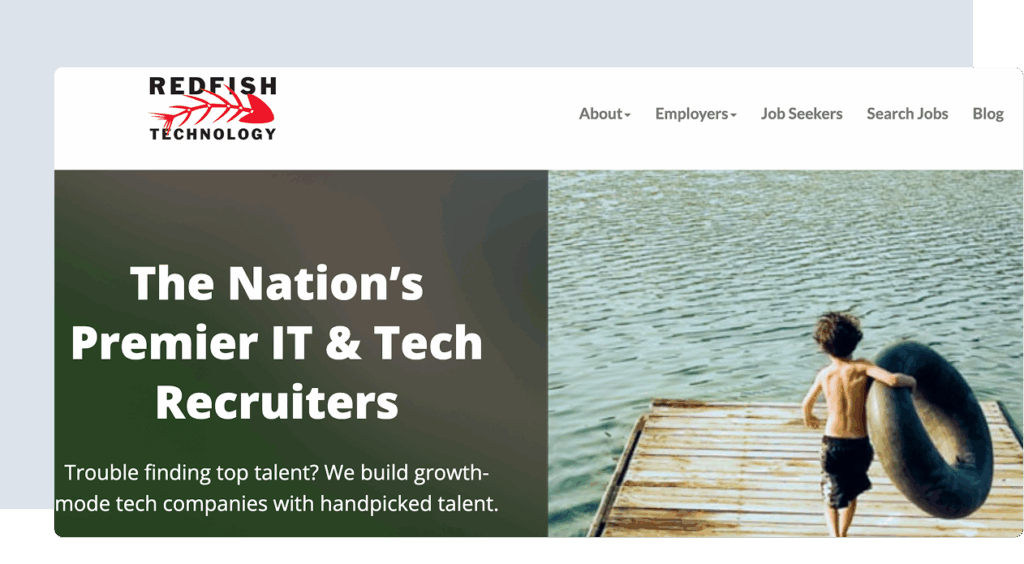
Redfish Technology focuses on emerging technology recruitment with particular strength in AI, ML, and data science placements. They’ve developed expertise in understanding how newer technologies impact hiring requirements and team structures.
Key Specializations:
- Machine Learning Engineers
- Deep Learning specialists
- NLP Engineers
- Computer Vision Engineers
- AI Product Managers
Best For:
- Startups and scale-ups in AI-first products
- Companies working with cutting-edge ML technologies
- Organizations building specialized ML teams (NLP, CV)
- Businesses needing candidates with specific framework expertise
Services:
- Contingency recruitment
- Executive search for senior ML leadership
- Technical vetting and skills assessment
- Advisory on ML team composition
Geographic Coverage: US-based with focus on major tech hubs (SF Bay Area, NYC, Boston, Seattle)
Notable Strengths:
- Understanding of emerging ML technologies and frameworks
- Network of candidates working on cutting-edge applications
- Ability to assess depth of specialized skills (transformers, GANs, reinforcement learning)
- Startup culture fit assessment
Typical Client: Technology companies at seed through Series B building AI-native products or adding significant ML capabilities to existing platforms.
Not Ideal For: Enterprise organizations seeking traditional staffing relationships, or companies needing ML talent in non-tech-hub locations.
5. DevsData LLC
DevsData LLC specializes in technical recruitment with strong capabilities in ML, AI, and data engineering. They’ve built particular expertise in evaluating candidates from diverse geographic backgrounds and managing remote hiring processes.
Key Specializations:
- Machine Learning Engineers
- Data Scientists
- AI Software Developers
- Backend Engineers with ML experience
- Data Engineers
Best For:
- Companies open to global talent pools
- Organizations building remote-first ML teams
- Startups seeking cost-effective ML talent without sacrificing quality
- Businesses needing nearshore or offshore ML capabilities
Services:
- International recruitment and placement
- Remote team building expertise
- Technical assessment and coding challenges
- Timezone-compatible candidate matching
Geographic Coverage: Global reach with strength in Eastern Europe, Latin America, and North America
Notable Strengths:
- Access to international ML talent pools
- Experience managing remote technical hiring
- Competitive pricing due to global candidate base
- Understanding of cross-cultural team dynamics
Typical Client: Startups and mid-size companies comfortable with distributed teams, particularly those seeking high-quality ML talent at more favorable compensation rates than US-only searches.
Not Ideal For: Organizations requiring on-site presence in US offices, or companies without established remote work infrastructure and processes.
6. Alpha Apex Group
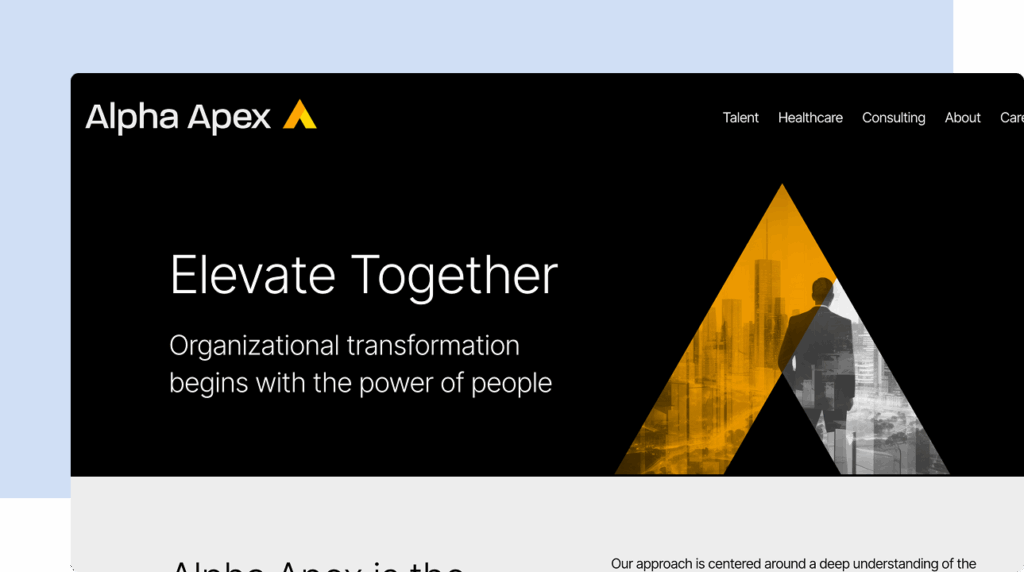
Alpha Apex Group operates as a boutique technical recruiting firm with specialized focus on AI and ML placements for technology companies. Their approach emphasizes deep technical vetting and long-term placement success over volume.
Key Specializations:
- Senior Machine Learning Engineers
- ML Infrastructure and MLOps
- AI Research Scientists
- Applied ML Engineers
- Deep Learning specialists
Best For:
- Companies seeking senior and staff-level ML talent
- Organizations building ML platform and infrastructure teams
- Startups requiring technical leadership hiring
- Businesses prioritizing candidate quality over speed
Services:
- Retained and contingency search
- Executive-level ML hiring
- Technical interview process design
- Long-term talent strategy consultation
Geographic Coverage: US-focused with particular strength in West Coast markets
Notable Strengths:
- Rigorous technical screening processes
- Focus on senior and leadership-level placements
- Understanding of ML infrastructure and platform engineering
- Lower volume, higher quality placement approach
Typical Client: Well-funded startups (Series A+) and mid-market companies building sophisticated ML capabilities requiring senior technical leadership.
Not Ideal For: Early-stage startups seeking junior to mid-level ML engineers, or companies needing rapid, high-volume hiring.
7. Keller Executive Search
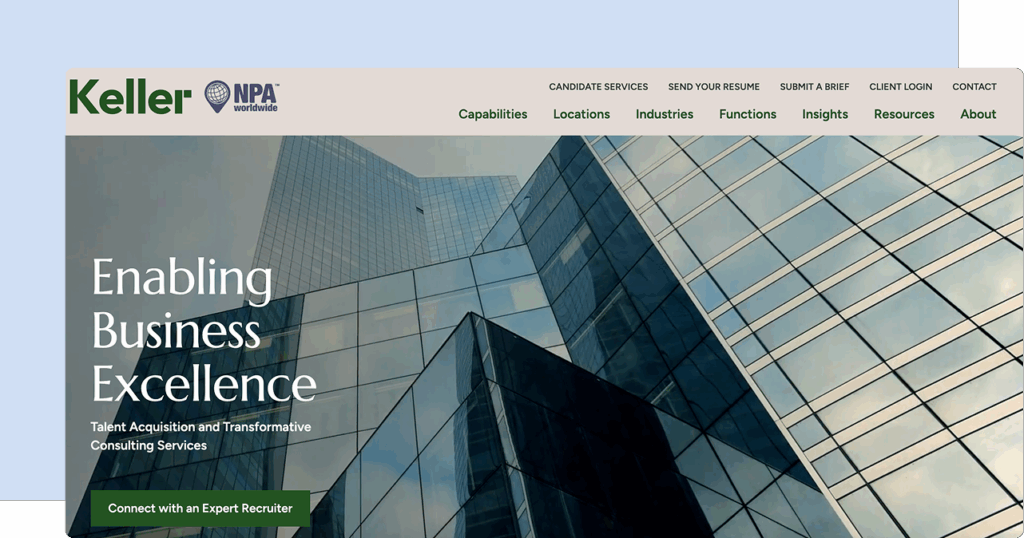
Keller Executive Search specializes in senior leadership and executive placements, including C-suite and VP-level AI and ML roles. Their expertise lies in identifying technical leaders who can both build teams and drive strategic vision.
Key Specializations:
- Chief AI Officers
- VP of Machine Learning / AI
- Directors of Data Science
- Head of ML Engineering
- Senior ML Research leadership
Best For:
- Companies hiring executive-level ML leadership
- Organizations transitioning to AI-first strategies
- Businesses seeking ML leaders with proven track records
- Scale-ups building out C-suite technical leadership
Services:
- Retained executive search
- Leadership assessment and evaluation
- Board-level consultation on AI strategy hires
- Succession planning for technical leadership
Geographic Coverage: Global reach with focus on North America and Europe
Notable Strengths:
- Extensive network of senior ML and AI executives
- Deep industry knowledge across sectors
- Thorough leadership assessment processes
- Long-term strategic partnerships with clients
Typical Client: Series B+ companies and established enterprises hiring VP-level and above technical leadership to drive AI initiatives at scale.
Not Ideal For: Startups seeking individual contributor ML engineers, or companies with budgets under $50,000 for executive search fees.
8. Razoroo
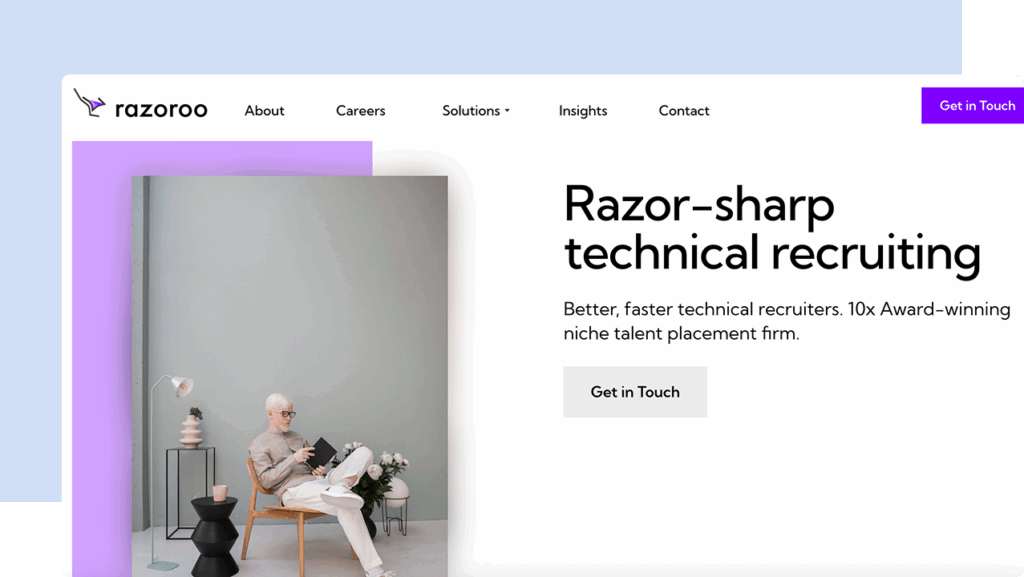
Razoroo positions themselves as a technology consulting and recruiting firm with particular strength in AI, ML, and modern development practices. They combine technical consulting with recruitment to provide strategic hiring guidance.
Key Specializations:
- Full-stack ML Engineers
- AI/ML Software Engineers
- MLOps and DevOps for ML systems
- Data Engineers supporting ML workflows
- Technical consultants with ML expertise
Best For:
- Startups needing both technical guidance and hiring support
- Companies uncertain about exact role requirements
- Organizations building AI capabilities from scratch
- Businesses seeking fractional technical leadership alongside recruitment
Services:
- Recruitment and placement
- Technical consulting and advisory
- Team structure planning
- Technology stack assessment
Geographic Coverage: US-based with remote hiring capabilities
Notable Strengths:
- Combined consulting and recruitment approach
- Hands-on technical understanding of ML implementation
- Ability to help define roles and requirements
- Startup-friendly engagement models
Typical Client: Early to mid-stage startups (pre-seed through Series A) that need strategic guidance on building ML capabilities alongside actual hiring.
Not Ideal For: Companies with established ML teams seeking straightforward recruitment without consulting needs, or organizations preferring pure recruitment relationships.
9. Radley James
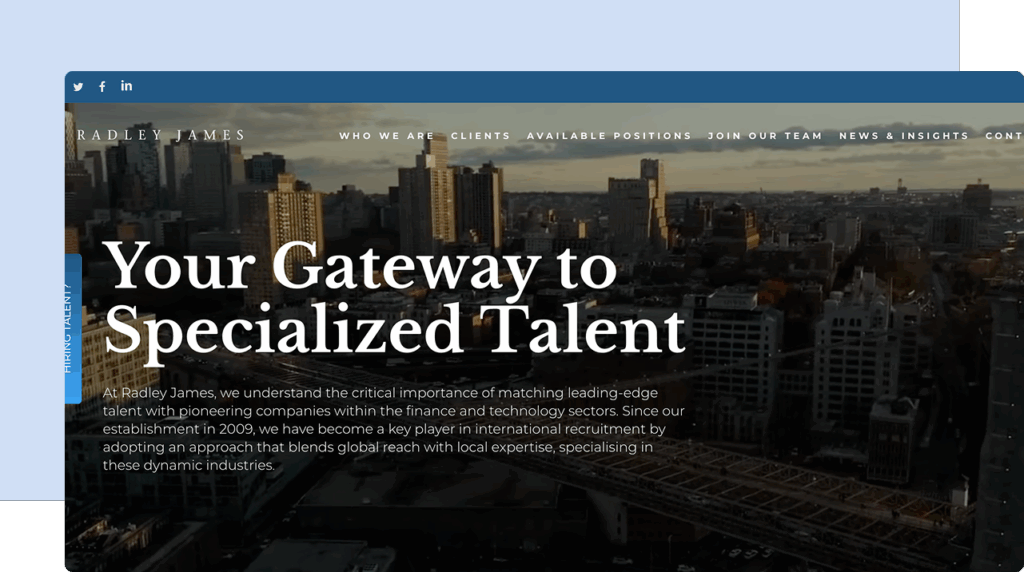
Radley James operates as a specialized technology recruitment firm with growing expertise in AI, ML, and data science placements. They’ve built particular strength in matching candidates with startup cultures and fast-paced environments.
Key Specializations:
- Machine Learning Engineers
- Data Scientists
- AI Engineers
- Research Engineers
- ML Platform Engineers
Best For:
- Startups seeking cultural fit alongside technical skills
- Companies in fast-growth phases
- Organizations needing flexible engagement models
- Businesses prioritizing startup experience in candidates
Services:
- Contingency recruitment
- Contract and permanent placements
- Technical screening processes
- Startup hiring strategy consultation
Geographic Coverage: US markets with focus on startup ecosystems (Bay Area, NYC, Austin, Boston)
Notable Strengths:
- Understanding of startup culture and dynamics
- Network of candidates experienced in early-stage environments
- Flexible, responsive approach to client needs
- Competitive fee structures for startups
Typical Client: Seed through Series B startups building ML capabilities, particularly those where cultural fit and startup adaptability are as important as technical skills.
Not Ideal For: Enterprise companies seeking traditional corporate candidates, or organizations prioritizing large-scale experience over startup agility.
What ML Recruitment Agencies Actually Cost: Pricing Breakdown
Let’s talk about what you’ll actually pay, since most agencies avoid this conversation until you’re already engaged. Standard placement fees range from 15-30% of the candidate’s first-year salary, with the most common range being 15-25%. For specialized ML roles, expect fees toward the higher end: typically 25-30% given the scarcity of qualified talent.
Here’s what this means in practice: If you hire a Machine Learning Engineer at $150,000 annual salary through a 25% contingency agreement, you’ll pay $37,500 upon successful placement. For a Senior ML Engineer at $220,000, that fee becomes $55,000 at 25%. These numbers feel significant until you consider the alternative cost of an extended vacancy.
Understanding Fee Structures
Contingency recruiting (most common for individual contributor roles): You only pay if they successfully place a candidate. No upfront fees, but multiple recruiters can work on your role simultaneously. Standard 90-180 day replacement guarantees apply if the hire doesn’t work out. This model works well when you need to fill roles quickly without exclusivity commitments.
Retained search (typical for executive and senior roles): You pay a portion upfront (usually one-third), another third at the midpoint, and the final third upon placement. This model runs 25-35% of first-year compensation but includes exclusivity and dedicated focus. Retained search makes sense for VP-level and above positions where cultural fit and leadership capabilities are as critical as technical skills.
Contract placement (for project-based work): The agency employs the contractor and marks up their hourly rate by 20-30%. If a contractor bills at $100/hour, you’ll pay $125-130/hour to the agency. Some agencies offer contract-to-hire arrangements where a portion of contract fees applies toward permanent placement.
What Affects Pricing
Several factors push fees toward the higher end of ranges. Role seniority and specialization significantly impact pricing—a VP of Machine Learning costs more to recruit than a mid-level ML engineer. Market scarcity for specific skills drives fees up; finding someone who truly understands LLM fine-tuning and deployment at scale commands premium pricing. Urgency matters too—if you need someone in two weeks rather than two months, expect higher fees. Geographic market plays a role, with US and Western European searches typically commanding higher fees than Eastern European or LATAM searches.
Calculating ROI
That $37,500 fee starts looking different when you consider the full picture. The average 42-day in-house time-to-fill versus 20-day agency placement saves roughly three weeks of productivity. For a revenue-generating role, those three weeks often represent far more than the placement fee in lost opportunity. Add the cost of bad hires—averaging $240,000 when accounting for productivity loss, team disruption, and replacement costs, and the agency’s 60-180 day guarantee becomes valuable insurance.
The hidden costs of in-house recruiting add up too: your technical team’s time conducting screenings, the opportunity cost of delayed projects, the risk of making a poor hire without deep ML vetting expertise. When you factor these elements, specialized agency fees often represent net savings rather than additional expense.
Should Your Startup Use an ML Recruitment Agency? Decision Framework
When to Use ML Recruitment Agencies
You should strongly consider specialized machine learning recruitment agency when hiring your first one to three ML engineers. These foundational hires set the technical direction for your entire ML capability, making expertise in vetting absolutely critical. Without internal ML knowledge to assess candidates, agencies provide essential technical validation.
Competing against big tech requires agency relationships. When that senior NLP engineer is also interviewing at Google and Meta, agencies help you position your opportunity effectively, move quickly through the process, and structure compensation packages that remain competitive even when you can’t match FAANG total comp.
Use agencies when you lack in-house technical recruiting expertise. If your HR team comes from non-technical backgrounds, they’ll struggle to distinguish between someone who’s run inference on a pre-trained model and someone who’s architected production ML systems handling millions of predictions daily. Agencies bridge this expertise gap.
Timeline pressure makes agencies valuable. If you need an ML engineer in four to six weeks to meet a product deadline or investor milestone, agencies’ pre-vetted talent pools and established relationships compress the typically lengthy ML hiring process.
Scaling ML teams rapidly (hiring three-plus engineers in six months) benefits from agency partnerships even if you have internal recruiters. Agencies supplement your capacity during growth spurts without requiring permanent headcount increases.
When NOT to Use ML Recruitment Agencies
Consider building in-house recruiting capabilities when you’re doing high-volume, ongoing ML hiring. If you need to hire fifteen ML engineers over twelve months consistently, the cumulative agency fees (potentially $500,000+) often justify hiring specialized technical recruiters who understand your specific needs and culture.
Extremely tight budgets under $10,000 available for hiring costs make agency fees prohibitive. In these situations, investing time in direct sourcing, employee referral programs, and building your employer brand delivers better ROI than stretching for agency fees.
If you’ve built a strong employer brand with established talent pipelines, you might not need external help. Companies with active ML engineering blogs, strong conference presence, and robust referral networks can often fill roles through direct channels.
Long-term relationship building over six to twelve months works better in-house when you’re not in immediate hiring mode. If you’re planning to hire eventually but want to build relationships with passive candidates over time, direct outreach by your team creates stronger connections than agency introductions.
How to Choose the Right ML Recruitment Agency: 7 Critical Factors
1. Technical Depth and Specialization
The fundamental question: Can they actually evaluate ML expertise, or are they matching keywords? When you meet with potential agencies, dig into their technical vetting process. Ask them to explain the difference between someone who’s deployed models with TensorFlow versus PyTorch—and why it matters for your specific use case. Quality agencies will discuss architectural patterns, production deployment considerations, and the trade-offs between different frameworks.
Red flag: Agencies that treat ML as generic “tech hiring” and can’t articulate specific technical assessment criteria beyond resume screening.
2. Network Quality and Reach
The shift toward AI has created unprecedented demand for ML talent, making network access critical. Effective agencies maintain relationships with passive candidates—engineers happily employed but open to the right opportunity. They’ve built these networks over years through consistent, non-transactional engagement.
Ask agencies: What percentage of successful placements come from passive versus active candidates? How do they maintain relationships with ML engineers between roles? Do they have specific networks in your needed specialization (NLP, computer vision, MLOps)?
3. Vetting Process and Quality Standards
Given the current market conditions, anyone can list “machine learning” on their resume. Quality agencies have developed rigorous vetting processes that go beyond resume keywords. They should conduct technical phone screens, review GitHub portfolios and publications, implement coding challenges specific to ML work, and assess real-world problem-solving approaches.
Request specific examples: Ask them to walk through how they recently vetted an ML engineer for a similar role. What technical questions did they ask? How did they evaluate model deployment experience versus pure research background?
4. Pricing Transparency and Structure
Agencies that clearly articulate their fee structure upfront demonstrate professionalism and respect for your planning process. Expect 20-25% for mid-level roles, 25-30% for senior and specialized positions, with clear explanation of payment timing and replacement guarantee terms.
Warning signs: Vague answers about “market-standard” fees without specifics, pressure to sign agreements before discussing pricing, or reluctance to explain fee variations.
5. Speed and Efficiency Track Record
For specialized ML roles, realistic time-to-fill expectations matter. Quality agencies should be able to present initial qualified candidates within seven to fourteen days and complete placements in fourteen to thirty days for most roles. More senior or highly specialized positions may extend to thirty to forty-five days.
Ask for specific metrics: What was their average time-to-fill for ML roles in the past quarter? How many candidates do they typically present before a successful placement? What’s their offer acceptance rate?
6. Market Intelligence and Advisory Capabilities
Beyond filling specific roles, strong agencies provide valuable market intelligence. They should offer current salary benchmarking data for your region and role level, insights into what competitors are offering, trends in ML skill demand, and guidance on realistic versus unrealistic requirements in job descriptions.
This advisory capacity helps you avoid common mistakes like requiring five years of experience with technologies that only emerged two years ago or setting compensation 20% below market and wondering why no qualified candidates respond.
7. Cultural Fit Assessment
Technical skills get candidates through the door, but cultural misalignment causes most placement failures within the first year. Effective agencies invest time understanding your company culture, team dynamics, and working style. They screen for cultural fit alongside technical capabilities.
They should ask questions about your team structure, remote versus in-office preferences, meeting culture, decision-making processes, and company values. If an agency only asks about technical requirements without exploring culture, expect higher turnover rates.
Frequently Asked Questions About ML Recruitment Agencies
How much do ML recruitment agencies charge?
Standard ML recruitment fees range from 20-30% of the candidate’s first-year salary, with most placements at 20-25% for mid-level roles. Specialized positions (senior NLP engineers, ML infrastructure leads) typically command 25-30%. For a $150,000 ML engineer, expect fees of $30,000-$37,500. Executive-level placements (VP of ML, Chief AI Officer) run 30-35% and typically use retained search models. These fees include 90-180 day replacement guarantees if the candidate doesn’t work out.
How long does it take to hire an ML engineer through an agency?
Specialized ML recruitment agencies typically complete placements in 14-30 days, compared to 42+ days for in-house recruiting efforts. The timeline breaks down roughly as: Days 1-7 for initial candidate sourcing and screening, Days 7-14 for client interviews and technical assessment, Days 14-21 for offer negotiation and acceptance, Days 21-30 for notice period and start date coordination. More senior roles or highly specialized positions (specific domain expertise in healthcare ML, autonomous vehicles) may extend to 30-45 days.
What if the ML candidate doesn’t work out?
Quality agencies offer replacement guarantees ranging from 90 to 180 days. If the candidate leaves voluntarily, is terminated for performance reasons, or proves to be a poor cultural fit during this period, the agency will restart the search at no additional fee. This guarantee protects your investment and demonstrates the agency’s confidence in their vetting process. Always clarify guarantee terms before engaging—specifically what circumstances trigger the guarantee and what timeline applies.
Do ML agencies only work with actively job-seeking candidates?
No—in fact, the most valuable agency relationships provide access to passive candidates who aren’t actively job hunting. These engineers are currently employed but open to the right opportunity. Passive candidates often represent higher quality hires since they’re moving for genuine interest in your company rather than desperation to leave their current role. Effective agencies have spent years building relationships with ML engineers through consistent, non-transactional engagement, giving you access to talent that never appears on job boards.
How do agencies vet ML technical skills?
Rigorous agencies implement multi-stage technical vetting: Initial resume and portfolio review assessing framework experience, publication history, and project complexity; technical phone screens covering ML fundamentals, algorithm knowledge, and framework-specific questions; coding assessments with ML-specific challenges (not generic algorithm questions); architecture discussions where candidates explain past system design decisions; reference checks specifically probing technical depth and deployment experience. The key differentiator is whether agencies have actual ML engineers conducting assessments or general recruiters doing keyword matching.
Can agencies help with remote or global ML hiring?
Yes, many specialized agencies have developed expertise in distributed team hiring. They assess additional factors critical for remote success: asynchronous communication skills, self-direction and autonomous work style, timezone overlap for collaboration, experience with remote-first workflows, and documentation practices. Some agencies (like DevsData LLC) specifically focus on global talent pools, providing access to high-quality ML engineers in Eastern Europe, Latin America, and other regions where compensation expectations allow better value without sacrificing quality.
ML recruitment agency versus in-house recruiting: Which is better?
The answer depends on your hiring volume, timeline, and internal capabilities. Use agencies when making your first ML hires without internal technical knowledge, competing against big tech for scarce talent, facing urgent timelines (need hire in four-six weeks), or lacking specialized ML recruiting expertise. Build in-house when hiring consistently (ten-plus roles annually), having established ML employer brand and pipelines, possessing time for relationship building over months, or when cumulative agency fees exceed internal recruiter costs. Many successful companies use hybrid approaches—internal recruiters for steady-state hiring, agencies for specialized or urgent needs.
What’s the difference between contingency and retained ML recruitment?
Contingency recruitment (most common) means you only pay if the agency successfully places a candidate. No upfront costs, but multiple agencies can work your role simultaneously. Typical for individual contributor through senior engineer roles. Standard fees are 20-25% with 90-180 day guarantees. Retained search involves exclusive partnership with upfront payment (usually one-third fee), typically for executive roles (VP level and above). Total fees run 25-35%, but you receive dedicated focus, deeper candidate assessment, and guaranteed effort regardless of outcome. Retained search makes sense when hiring is business-critical and requires the recruiter’s full attention.
Finding the Right ML Recruitment Partner
The machine learning talent landscape continues evolving rapidly, with AI reshaping not just what developers build but who you need to hire. Modern ML teams require engineers who understand both traditional software engineering patterns and AI-integrated workflows. This complexity makes specialized recruitment partnerships increasingly valuable.
When evaluating agencies, prioritize technical depth over network size alone. The agency that can explain why your Next.js application needs someone who understands React 18’s server-side rendering will find better matches than one simply screening for “React experience.” Look for transparent pricing, honest assessment of timeline expectations, and willingness to provide strategic guidance alongside recruitment services.
Start by reaching out to two to three agencies that align with your specific needs—whether that’s early-stage startup expertise, executive leadership hiring, or specialized technical domains like NLP or computer vision. Initial consultations should feel collaborative rather than transactional, with agencies asking as many questions about your culture and technical architecture as they do about the role requirements.
The right ML recruitment partner becomes an extension of your team, helping you navigate market realities, structure competitive offers, and ultimately build the technical capabilities your business requires. In a market where 85% of organizations struggle to hire AI developers, having specialized expertise on your side significantly improves your odds of success.
Let’s discuss your specific hiring challenges and map out the skills your next ML hire needs to drive your company forward. Contact Omnes Group to start a conversation about building your machine learning team.